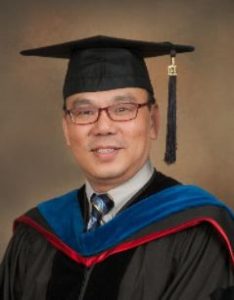Over 40 presentations and live panel debates from leading educators and innovators of educational technology (edtech) from across the country were broadcasted during the two-day EDUtech Malaysia 2022.
The virtual conference held from 9 to 10 March saw an overwhelming response from the #EDUtechMsia community, where they gained insights and knowledge from talks by inspirational educators. These educators came together to debate burning questions which had arisen from growing concerns in the education industry. Besides presentations and live panel discussions, attendees were also able to take part in fireside chats and interactive Q&A sessions.
Amongst them were our very own educators from the senior management team of INTI International University & Colleges, Dr. Jane Lim, Vice President, Campus Academic Operations and Chief Executive of INTI International College Subang, and Dr. Joseph Lee, Vice Chancellor of INTI International University. They shared their expertise separately across two sessions titled ‘Upskilling and Reskilling: Developing Digitally Competent Faculty for The Education 4.0 Age’ and ‘Building A Culture of Digital Innovation and Collaboration in Higher Education Institutions’ respectively.

Dr. Jane Lim, Vice President of Campus Academic Operations and Chief Executive of INTI International College Subang believes continuous reforming, improving, and adapting the curriculum in the education system, will activate higher standards leading to better employability among graduates.
During the virtual fireside chat session, Dr. Jane shared that technology has become part and parcel of our lives today.
“The way we teach and learn have evolved so much over the years in which various technologies are heavily used in the teaching and learning contexts. From just using technology to support teaching and learning activities, now, education institutions are using technology to provide personalization of learning, networking or connectivity, engagement, knowledge building, and more,” she said.
Dr. Jane further illustrated that besides embedding technologies into teaching and learning methods, the Education 4.0 programme will provide graduates with the capabilities and competencies required by the digital-driven industry. She added that this is an initiative that calls for academics and educational institutions to align their curricula to prepare students for an Industry Revolution 4.0 (IR4.0) workplace which highly involves talents equipped with not only human-based skillsets but also digital skills.
“The education landscape has changed and I’m certain that it will continue to. Thus, academics are encouraged to have an open mindset, creativity to adapt to latest industry trends, and willingness to explore new ways of conducting their classes,” she said.
Sharing her personal experience, Dr. Jane shared, “I still remember when the pandemic first began and we were all forced into a Movement Control Order (MCO), all educational institutions had no choice but to convert all their classes online. Our biggest challenge was converting practical classes of the hospitality programmes. We cracked our heads on how to conduct classes related to restaurant services, beverage making, butchering, and more via our existing online platform but as time passed and the MCO restrictions didn’t seem to loosen, our lecturers stepped up their creativity.”
While virtual learning is not the same as face-to-face sessions, she said the bright side was that students were able to continue learning and graduate on time. After weeks and months of exploring and experimenting various methods and techniques, lecturers and students found the best way to technologically adapt to the situation.
“The government’s plan to align curriculum design of higher education institutions and in-demand digital skills of the industry by 2025 is a strategic move to improve the capability of students to be future work-ready. As digital skills become must-haves in future jobs, intimate strategic collaboration among the government, industry, academia, technical and vocational education training (TVET) and other relevant stakeholders is critical in ensuring wide-scale digital reskilling and upskilling in both the pre-employment and employment ecosystems,” she said.

Dr. Joseph Lee, Vice Chancellor of INTI International University, admits that academics need to accept that the teaching profession and learning approaches have been rather orthodox with limited innovations and changes in education
She concluded that by continuously reforming, improving, and adapting the curriculum in the education system, the result is higher standards leading to better employability, and sought-after digital skills.
Meanwhile, Dr. Joseph shared insights during a session titled ‘Building A Culture of Digital Innovation and Collaboration in Higher Education Institutions’.
“Without a doubt, education is always a priority and driver for development, and, on the other hand, the history of educational development is the history of technological development. For example, while it seems to be fundamental now, one of the most notable technological advancements in education we must appreciate is the invention of paper and printing which enabled the availability of education to the general population without which education would remain an exclusive prerogative enjoyed by a tiny minority of privileged people. In every sense, the invention of paper and printing has played an important role in catalyzing educational equity,” he said.
However, while technologies for education and technologies in the classroom have evolved, Dr. Joseph admitted that academics need to accept the fact that the teaching profession and learning approaches have been rather orthodox with limited innovations and changes in education as most of them were inspired by external changes brought in by global market trends and needs.
He went on to explain that by providing an example about one of the major moves induced by market trends in higher education, as compared to earlier eras focusing on knowledge transfer and knowledge development, may be the needs for a more comprehensive skillset from learners that includes cognitive skills, socio-emotional skills, technical skills, and digital skills. The needs for a wider variety of educational programmes and the development of skills can contribute to the structural transformation due to global mega trends such as the rising role of technology, climate change, demographic shifts, urbanization, and the globalization of value chains which are changing the nature of work and demands for skills.
Dr. Joseph added, “Similarly, the recent movement into the internet-based e-learning definitely is another example of change in education triggered by an external shock, that is the disruptions in the supply and delivery of education caused by COVID-19.”
To the least, all of us should agree, the experience gained during the pandemic has enriched and broadened the approach of teaching and learning; namely in most cases, the infrastructure supported by appropriate learning management system (LMS) of institutions may be considered to be adequate or good from a technical point of view.
“Educators need to use technology effectively in their practice and connect technologies to a learning theory. In other words, stakeholders should not only commit to working together to use technology to improve education, but it may also be more interesting and essential to see how to reinvent our approaches to learning and collaboration that leads to changes in educational technologies so as to meet the needs of all learners since innovation is ultimately about finding new and creative ways to solve challenges and adjusting and modifying something that already exists and to enhance it further,” Dr. Joseph stated at the panel session.
He added, “Among the proposed concrete actions is to make free and open source technologies available to teachers and students. Open educational resources and access to digital tools must be supported. Education cannot thrive with ready-made content built outside of the pedagogical space and outside of human relationships between teachers and students nor can education be dependent on digital platforms controlled by private organizations.”
Dr. Joseph believes that education is crucial in the post pandemic era to realize the fourth United Nations Sustainable Development Goal which is to ensure inclusive and quality education for all and promote lifelong learning.
“Technology has never proved to be a panacea for education. When it comes to education, the center of attention is supposed to be human beings rather than technology or educational content. Indeed, now is the time to ask what is past, what is present, and what is next, turning this crisis into an opportunity for a new beginning in education and to build back better,” said Dr. Joseph as his closing statement.